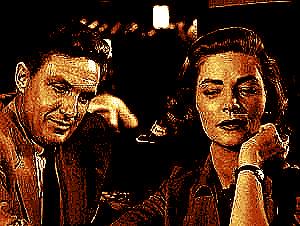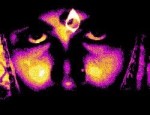Film Review

Written on the Wind's most obvious attraction is its stellar cast. Rock Hudson and Lauren Bacall bring star quality to the film, but it is the contributions from Robert Stack and Dorothy Malone that make it so memorable. Malone won an Oscar for her portrayal of the manipulative nymphomaniac sister Marylee, which made her the prototype for every conniving soap bitch since. Stack gives the performance of his life, convincingly playing a man who is tortured by inner demons which, in the best tradition of Greek tragedy, drive him to an ignominious self-inflicted doom. To quote one line in the film, what is there not to like? Sirk brought the winning team of Hudson, Malone and Stack back together for a later film, The Tarnished Angels (1957).
Like much of Sirk's work, Written on the Wind is a film that requires at least two or three viewings for its subtle messages to have their full impact. Even then, some viewers will find it hard to see beyond the slick surface artifice which Sirk uses with such a delicious sense of irony. Here, Sirk is simultaneously capitalising on the enormous popularity of a genre of vacuous, lowbrow cinema (which he personally had little regard for) and exploiting its form to craft a merciless satire on the failings of a stratum of American society. Was there ever a filmmaker for whom the phrase "there is more to this than meets the eye" is more appropriate?
© James Travers 2008
The above content is owned by frenchfilms.org and must not be copied.
Film Synopsis
Kyle Hadley, the son of one of America's wealthiest oil magnates, is used to getting what he wants. As soon as he meets Lucy Moore, the secretary of an advertising executive, he is determined to take her as his wife. Lucy is at first suspicious of Kyle's motives but, after a whirlwind romance, they marry and, to the outside world, they appear to be the perfect wedded couple. However, Lucy has another admirer - Kyle's friend and business partner Mitch Wayne. Mitch is so in love with Lucy that he no longer has any interest in his childhood sweetheart, Kyle's sister Marylee. The latter is obsessively attached to Mitch and is determined to win him at any price - even if it means destroying her own brother...© James Travers
The above content is owned by frenchfilms.org and must not be copied.
Similar Films
Here are some other films you may enjoy watching:Other related links:
Film Credits
- Director: Douglas Sirk
- Script: George Zuckerman, Robert Wilder (novel)
- Cinematographer: Russell Metty
- Music: Frank Skinner
- Cast: Rock Hudson (Mitch Wayne), Lauren Bacall (Lucy Moore Hadley), Robert Stack (Kyle Hadley), Dorothy Malone (Marylee Hadley), Robert Keith (Jasper Hadley), Grant Williams (Biff Miley), Robert J. Wilke (Dan Willis), Edward Platt (Dr. Paul Cochrane), Harry Shannon (Hoak Wayne), John Larch (Roy Carter), Joseph Granby (Judge R.J. Courtney), Roy Glenn (Sam), Maidie Norman (Bertha), William Schallert (Jack Williams (reporter)), Joanne Jordan (Brunette), Dani Crayne (Blonde), Dorothy Porter (Secretary), Gail Bonney (Hotel Floorlady), Paul Bradley (Maitre d'), Robert Brubaker (Hotel Manager)
- Country: USA
- Language: English
- Support: Color
- Runtime: 99 min
The best of Indian cinema

The very best French thrillers

The Golden Age of French cinema
